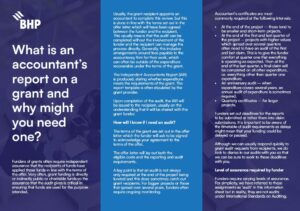

At BHP, our specialist grants team brings extensive experience in grant audits for all key funding bodies as well as charitable grant makers, including:
Our expertise spans across multiple sectors, from corporate to not-for-profit, and education. We work closely with our clients to help them understand eligible expenses, fairly maximise their claims, and streamline the grant claim process.
As a top 40 UK firm, BHP offers clients access to in-house specialists across all areas of practice. Additionally, many grant claims may qualify for Research and Development Expenditure credits for Corporation Tax. Our dedicated teams ensure that our clients maximise these opportunities when grant spending meets eligibility criteria.
An Accountant’s Report on a grant provides independent assurance that the funds have been used in accordance with the grant terms offered by the funder. Typically, the grant recipient appoints an accountant to conduct this review, following the terms outlined in the offer letter agreed upon by the funder and recipient. This process generally occurs without the direct involvement of the funder, allowing the recipient to appoint an auditor and manage the process independently.
The Independent Accountants Report (IAR) confirms whether the expenditure meets the grant’s requirements, often using a template provided by the grant provider. Upon completion, the IAR is issued to the recipient with the understanding that it will be shared with the grant funder.
The necessity of an audit, along with eligible costs and reporting requirements, is detailed in the offer letter from the funder. It’s important to note that an audit may not be required until the end of the funded project. For larger or multi-year projects, ongoing or more regular monitoring might be mandated by the funder, this will all be laid out in the offer letter.
Although we can usually respond quickly to grant audit requests from recipients, we do look to diarise in our audits with you so that we can be sure to work to these deadlines with you.
The level of assurance required by individual funders varies. Typically, the work is sample-based, though occasionally, accountants must review 100% of the costs. Some funders have specific requirements for our procedures, while others leave it to our judgment, this will all be set out in the offer letter.
We will conduct a planning exercise with you to understand your records, expenditure controls, and the documentation required.
We will usually test a sample of the costs, based on project materiality, to ensure they are valid, properly defrayed (spent/physically paid) during the grant period, and in accordance with the grant offer and any subsequent variations.
